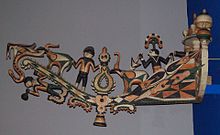Max Buchner (doctor)
Max Joseph August Heinrich Markus Buchner , also: Maximilian Buchner, (born April 25, 1846 in Munich , † May 7, 1921 in Munich) was a German doctor , ethnographer , explorer and museum curator.
Life
After graduating from the Wilhelmsgymnasium in Munich in 1864 , Buchner studied medicine and became a ship's doctor at the North German Lloyd . In 1875 he began a trip around the world, during which he stayed in New Zealand and on various islands in the South Seas . At the end of 1878, on behalf of the African Society in Germany, he went to equatorial West Africa in the Lunda Empire . Here he was supposed to bring presents in the name of Kaiser Wilhelm I. Buchner stayed in the capital Mussumba for half a year and during this time he waited in vain for permission to travel north. Three attempts on his own failed, on the last attempt, almost all porters fled across the Loange , so that he had to return to the coast.
On the way home, Buchner visited the Congo at the end of 1881 , where he came to the Isanglia station . From May 1884 he was a travel companion of Gustav Nachtigal on behalf of the imperial government to raise colonial claims against West African rulers and European competitors. His travel destinations were the controversial coastal countries Kapitaï and Koba as well as the later German colonies of Togo and Cameroon . Nachtigal appointed him provisional representative of the German Empire in Cameroon, based in Duala . Buchner stayed here until July 1885 and undertook several excursions into the nearer inland areas. In 1884, with the support of the German military, he took part in the looting of the property of the England-friendly local chief Kum'a Mbape ("Lock Priso") in Hickorytown. a. the Duala king King Bell (N dumb'a Lobe) in the course of an internal war conflict and captured an insignum from Lock Priso, a tangué (artfully decorated ship's beak ):

"22nd December: [...] Hickorytown [...] The house of Lock Priso [Kum'a Mbape] is torn down, a moving, picturesque picture. We light. But I asked myself that I could look through the individual houses for ethnographic peculiarities beforehand. My main booty is a large carving, the feudal barge jewelry of Lock Priso, which is to come to Munich.
December 23rd: [...] For our part, the day passed without a warlike event. King Bell continues to rob. In Hickorytown he set fire to a lot ... "
Between 1887 and 1907 Buchner was director and curator of the Royal Ethnographic Collection in Munich. In this capacity he undertook a trip to Australia , German New Guinea and East Asia from August 1888 to April 1890 .
tomb
The tomb of Max Buchner is on the old southern cemetery in Munich (burial ground 1 - Series 2 - Place 10/11) Location .
Publications
- Journey through the Pacific . Wroclaw 1878
- Cameroon. Sketches and reflections . Leipzig 1888
- Aurora Colonialis. Fragments of a diary from the beginning of our colonial policy, 1884-1885 . Munich 1914
literature
- Buchner, Max , Deutsches Kolonial-Lexikon , Vol. 1, Leipzig 1920, p. 248.
- Otto Maull: Buchner, Max Joseph August Heinrich Markus. In: New German Biography (NDB). Volume 2, Duncker & Humblot, Berlin 1955, ISBN 3-428-00183-4 , p. 705 ( digitized version ).
- Beatrix Heintze (ed.): Max Buchner's trip to Central Africa 1878–1882. Letters, reports, studies. (= Africa Archive 2), Cologne 1999
- Hans Holzhaider: Max Buchner - A Bavarian on behalf of his majesty.
Web links
- Literature by and about Max Buchner in the catalog of the German National Library
Individual evidence
- ^ Annual report from the K. Wilhelms-Gymnasium in Munich. ZDB ID 12448436 , 1863/64
- ↑ Hans Holzhaider: A Bavarian on behalf of His Majesty. Süddeutsche Zeitung, January 8, 2017, accessed on June 11, 2017 .
- ↑ Isabel Pfaff: Under a false flag. An African treasure has been hanging in the Munich Völkerkundemuseum since 1885 , Süddeutsche Zeitung , June 20, 2013, p. 11.
- ↑ Joachim Zeller: The royal insignia of Kum'a Mbape from Cameroon - The dispute over colonial looted property in the Munich Ethnological Museum, in: Ulrich van der Heyden, Joachim Zeller (ed.): Colonialism here in Germany - A search for traces in Germany. Sutton Verlag, Erfurt 2007, ISBN 978-3-86680-269-8 , pp. 328–329.
- ↑ Barbara Johanna Heuermann: The schizophrenic ship's beak: biography of a colonial object and discourse about its reclaim in post-colonial Munich . Studies from the Munich Institute for Social Anthropology, volume 17 . Munich 2015.
- ^ Anne Splettstößer: A Cameroonian Cultural Heritage? Agency shared for 130 years: The Tange / Schiffschnabel network . In: Stefan Groth, Regina F. Bendix, Achim Spiller (eds.): Culture as property instruments, cross-sections and case studies . Göttingen studies on cultural property, volume 9 . Göttingen 2015, p. 199-223 .
- ↑ Max Buchner: Aurora colonialis - fragments of a diary from the first beginning of our colonial policy 1884/1885. Piloty & Loehle, Munich 1914, p. 194. (Unchanged facsimile reprint, Fines Mundi, Saarbrücken 2016.)
- ^ Anne Dreesbach and Michael Kamp: Colonialism in Munich . In: Ulrich van der Heyden and Joachim Zeller (eds.): Colonialism in this country - A search for traces in Germany. Sutton Verlag, Erfurt 2007, ISBN 978-3-86680-269-8 , p. 69 ff.
| personal data | |
|---|---|
| SURNAME | Buchner, Max |
| ALTERNATIVE NAMES | Buchner, Max Joseph August Heinrich Markus; Buchner, Maximilian |
| BRIEF DESCRIPTION | German doctor, ethnographer and explorer |
| DATE OF BIRTH | April 25, 1846 |
| PLACE OF BIRTH | Munich |
| DATE OF DEATH | May 7, 1921 |
| Place of death | Munich |

